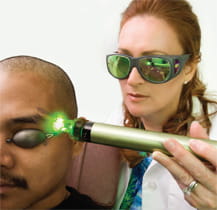
Minutes after the last socialite of the day has received her laser facial and driven off into Honolulu traffic, the next patient is escorted into the waiting area at Aesthetica Plastic & Laser Surgery Center. Shackled and flanked by prison guards, he takes a seat. Dr. Joy Bliss emerges, wearing a white lab coat and a radiant smile. She guides the young man into a treatment room and gently touches his shoulder. “This may hurt,” she says.
During the past 15 years, more than 1,000 ex-gang members have gone under Bliss’s laser to remove tattoos in hopes of starting over. “Generally, these are kind men and women who have made mistakes,” she says. “I try not to judge them as lost causes just because they’re in prison.”
Bliss’s philosophy of nonjudgment runs deep. Raised in Canada during a time when aboriginal peoples were stigmatized by the non-Indian population, she learned at age 40 that she herself had Métis and Cree roots. It was a secret her parents and grandparents had kept buried to protect the family from prejudice and marginalization. “I think this is why I can look beyond a tattoo symbolizing number of people killed and see a human being on a path of heartbreak,” she says.
A registered nurse who has followed diverse career paths—including bereavement consultant, marketing director, and manuscript editor—Bliss married into her current line of work. Shortly after completing her PhD in Administration/Management (now PhD in Management) at Walden, she and her husband, Dr. Greg Caputy, M.D., moved to Hawaii and opened their plastic and laser surgery clinic. Her degree allowed her to assume the role of chief operating officer. While pregnant with her second son, she read a newspaper article about a 12-year-old boy born with a disfiguring port-wine stain on his face. Inspired, Bliss and her husband volunteered to treat the boy at no charge.
True to Walden’s mission of social change, this experience was the seed that grew into Aesthetic Community Services, Inc., the clinic’s nonprofit arm, in 1996. Dr. Caputy then founded the Hawaii chapter of the X-Tattoo Program, a national organization that removes tattoos from former gang members. Committed to helping men and women erase “a reminder of a time in their lives that wasn’t the best,” Bliss’s efforts garnered the Hawaii Governor’s Award for Outstanding Community Service in 2000. She says her only disappointment is not always knowing what becomes of her patients. There is, however, one notable exception.
“Someone had chopped down a tree on our property, and we called the police to investigate,” she recalls. “The officer who responded looked at us and said, ‘Remember me? You took my tattoo off.’ He had come full-circle. It helped validate that what we do is worthwhile.”
To tell us about your Beyond the Degree career, email [email protected].



